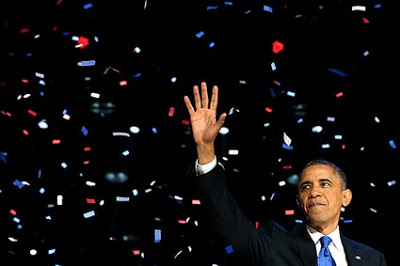There will be scores of books written and words piled up alongside the mounting American debt to fathom the results and consequences of the 2012 U.S. election.
In columns of such limited space as these, one can only suggestively wink at, as I once wrote, the complexity of subjects such as this requiring treatment at much greater length to do them justice.
On Tuesday evening, American voters balked on seeing their republic at a fork in the road — one path sloping towards greater dependency of individuals on the big government welfare state, and the other towards keeping secure the American ideals of individual freedom and responsibility — and voted to maintain the status quo of the past two years.
Republicans remain in control of the House, Democrats in control of the Senate, and the incumbent returns to the White House after an estimated cost of nearly $6 billion spent on the election.
This status quo reflects a bitterly divided America.
The 2012 election turnout was lower than that of 2008. According to the U.S. Federal Election Commission, 131 million Americans voted in 2008; the 2012 election turnout is estimated to be around 119 million.
In 2008, Obama’s share of the popular vote was shy of 69.5 million, or 52.9% of the total vote cast. Though his share of the 2012 popular vote was significantly less at 60.7 million or 50.4% of the total, it allowed him to squeeze a win.
In 2008, John McCain, the Republican nominee, received 59.9 million votes or 45.7% of the total.
Mitt Romney received 48% of the total vote in 2012, and though his share of 57.8 million votes fell below McCain’s, he received more electoral college votes.
The difference in numbers between an Obama win and a Romney loss was approximately the difference in numbers between those who voted for McCain in 2008 but did not vote for Romney. These nominally Republican voters staying home in the 2012 election, whether they were discouraged conservatives or unenthused independents, left the better man as a loser.
The fundamentals of the American economy — the figures for unemployment, people on food stamps, debt burden, depressed income, gas prices, the cost of Obamacare — were indicative of a failed Obama presidency.
But most of us anticipating a Romney presidency misread how greatly the American electorate has changed over the past three decades.
Open immigration since the mid-’60s has altered America’s demographic profile, as it has Europe’s and ours in Canada. During these decades, multiculturalism, with its attendant political correctness, have also greatly affected, in my view for the worse, the values of work, thrift, freedom and responsibility at the heart of America’s great republican adventure.
I have received my share of vitriolic mail — the occupational hazard of standing in the public square — and likely more will come.
It is a bracing experience to take such mail as bird droppings, to wash them away without any disquiet, and move on with the task at hand.
I also know keeping faith in democracy is not forgetting, as Churchill with irony and given his bittersweet experience in politics observed, “The best argument against democracy is a five-minute conversation with the average voter.”
- Israel: Decades-old conflict not about to cease - Saturday November 24, 2012 at 1:56 pm
- The better man lost the U.S. election - Saturday November 10, 2012 at 9:16 am
- The puzzle in U.S. presidential elections - Saturday November 3, 2012 at 8:43 am




